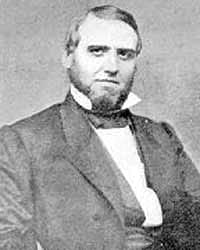Alexander K. McClure was active in the Republican party, campaigning and supporting Abraham Lincoln. In addition, McClure was an attorney and editor of the local newspaper, Franklin Repository. He was an outspoken critic of the Confederacy and escaped retaliation on his property or person at the two previous invasions of Chambersburg, but in 1864, he was not so fortunate. The following is excerpt from Rev. Benjamin Schenck’s account of the burning.
“Colonel McClure’s beautiful residence, one mile from the centre of town, was evidently marked out for destruction, for no other house between it and the burnt potion of the town was fired. The Colonel was known as a prominent man in National and State affairs, and, after the raid of General “Jenkins and the succeeding invasion by General Lee’s army, he had spoken of Jenkins and his men in no complimentary terms in the paper of which Colonel McClure is chief editor. And although no house in the community was more coveted by rebel officers to be quartered in than his, and for the reason, doubtless, that every comfort and luxury could be had in it, and although Mrs. McClure had, with her well known generosity and kindness of heart, ministered to the necessities and comforts of the sick and wounded insurgents, which were left during General Lee’s invasion, for which she has since received the most touching acknowledgments from some of them — yet, his property was doomed, irrevocably doomed to be burnt. Captain Smith, son of Governor Smith of Virginia, with a squad of men, passing by all the intervening houses, entered the devoted mansion with the information to Mrs. McClure, then and for some time before an invalid, that the house must be burned by way of retaliation. Ten minutes were given her in which to leave the house, and in less than ten minutes the flames were doing their work of destruction, and Mrs. McClure and the other members of the family at home, started on foot, in the heat of one of the hottest days I have ever known, in order to escape the vengeance of the chivalry
Whilst the flames were progressing in the house as well as the large and well-filled barn, the Captain helped himself to Mrs. McClure’s gold watch, silver pitcher and other valuables. The gold watch and other articles were easily concealed, but the silver pitcher was rather unwieldy, and could not be secreted from profane eyes as he rode back through town from the scene of his triumph. He resolved, therefore, to give a public display of his generosity. He stopped at the house of the Rev. James Kennedy, and handed the pitcher to his wife, with the request, “Please deliver this to Mrs. Colonel McClure, with the compliments of Captain Smith.”

